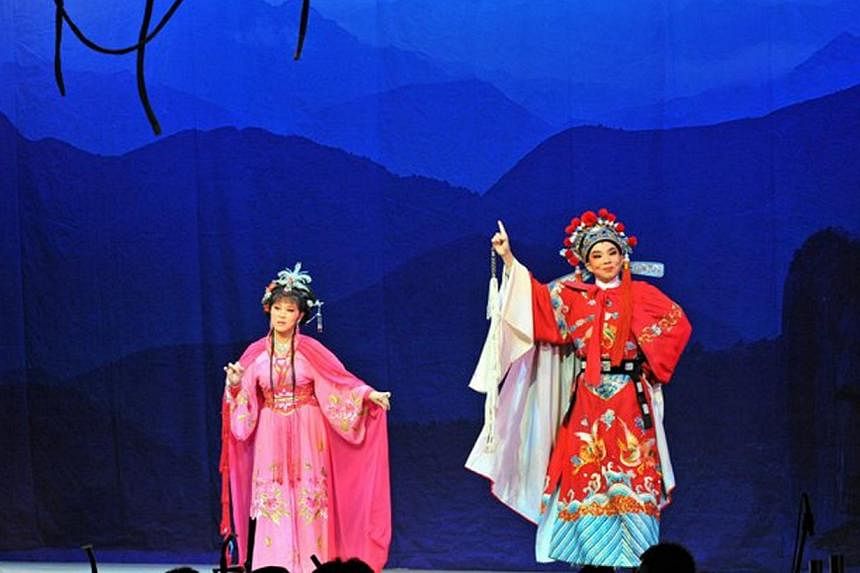ONE of the perks - or duties, depending on how you look at it - of my work as deputy chief executive officer of the National Arts Council (NAC) is that I get to experience a broad swathe of Singapore's arts offerings, including arts exhibitions, theatrical productions and book launches.
One recent production not only proved deeply enjoyable, but also provided additional food for thought. It was a Teochew opera whose name loosely translates as "One Household, Three Scholars", staged by Nam Hwa, an amateur troupe that is well-respected by the Teochew community here.
The opera revolves around Madam Sun, whose two sons are taken away when she is unable to repay debts incurred to fund her husband's journey to the capital to take the imperial examinations.
She faces great personal hardship, and is unaware that her sons have grown into accomplished scholars. The opera ends on a joyous note - she is united with both her husband, now a high-ranking official, and her two sons.
The arts can ask tough questions, shine a light on the shadows and margins of society, or make you shift uncomfortably with provocative ideas. But this opera doesn't do that.
Instead, it reminds one of the fundamental ability of the arts to please audiences, as well as reaffirm a shared identity and universal truths. This, too, has its place in our cultural landscape.
The homespun values underpinning the operatic narrative - such as unconditional familial love and filial piety - might seem simplistic to some but, in my mind, they are deeply resonant, no different from Shakespeare's celebrated comedies.
These plays feature protagonists facing insurmountable odds, almost incredulous coincidences and, amid the chuckles elicited by "clown" characters, the reunion of separated lovers or family members.
Of course, a happy ending is de rigueur. At some deep human level, we like our narratives to end on an uplifting note, with the loose ends tied up, even if we accept that real life is far more complex, even morally ambiguous.
Centuries-old art form
LITTLE wonder that the largely Teochew - and white-haired - audience was hugely appreciative, crying out "Good show!" during the curtain call.
To me, the show, staged at the Drama Centre, is also a validation of a 450-year-old art form, and it stirred the memories of many in the audience, who must have watched such shows growing up, probably in less formal settings.
Perhaps more amazing is that the cast is largely amateur, although trained by an opera veteran from China. I had feared I would drift off, given my lack of exposure to full-length Chinese operas, but the performers were engaging, aided by a melodious chorus - apparently a unique feature of Teochew opera - and gorgeous sets.
(As a far-from-fluent Teochew speaker, I could imagine how the older audiences felt when they heard the emcee announce in effortless dialect the arrival of the guest of honour. Were the feelings of collective familiarity also tempered by sadness at the impending loss of a beloved patois?)
Notwithstanding the high quality of the production, and the strong audience turnout, the Chinese opera connoisseur is an ageing demographic.
This has deep implications for the next generation of audiences and performers. For example, who will be able to speak the dialect well enough to sing on stage?
One surreal moment during the opera took place when the maids of a wealthy household made their first appearance. Delicate, even coquettish in manner, they are meant to be played by young lithe actresses but, in this production, the roles fell to women of, shall we say, a more mature vintage.
Although it was startling initially, one eventually forgave this casting decision, given the earnestness and industry of all the actors.
But the question of finding new audiences and people to succeed pioneer generation artistes is a real one for Singapore's traditional arts. The NAC can do its best to make sure that these troupes are meaningfully supported by, for instance, helping them to modernise their shows without losing the core of the craft.
Subtitles in English and Chinese are obviously necessary, but what else?
Bridge to ethnic groups
THIS dilemma applies to much of the traditional arts across our ethnic groups. How are such traditions relevant to Singaporean youth today? Contemporising the art form, while respecting its heritage, isn't easy - but surely this could also be an opportunity, challenging the more ready groups to innovate? It could even build new bridges to other ethnic and language groups, and expand audiences.
The truth is that, without a community to draw energy from, productions - no matter how professionally staged - will play to empty houses.
That would be a parlous state of affairs. Without the collective largesse of individual patrons and corporate aficionados, these groups might also become overly reliant on only one source of support - the state.
It is easy sometimes to be dazzled by the glitz and glamour of today's contemporary arts, especially those that hail from rich Western traditions.
Even as Singaporeans become more sophisticated in the appreciation of the arts, from provocative theatre to experimental performance arts, it is worth reminding ourselves that our heterogeneous citizenry hankers for all kinds of artistic stimulation.
With our modern outlook and increasingly English-speaking disposition, we should make more effort to remember the cultural diet our pioneers were weaned on, and celebrate how these art forms, through years of appreciation, have become integrated with a sense of being, and how they could be the start of our own artistic discoveries.
The writer is deputy chief executive officer of the National Arts Council, and a published poet.

